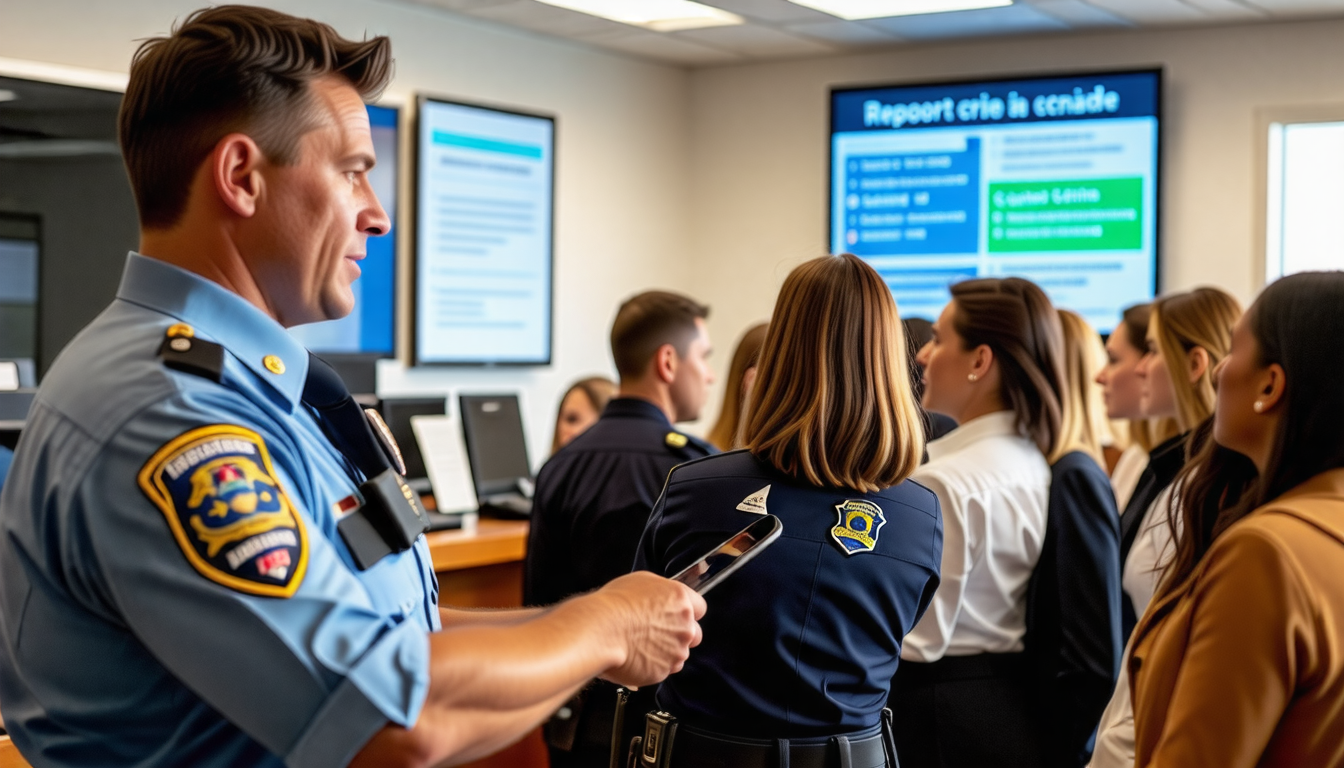|
IN BRIEF
|
In a society where safety and justice are paramount, understanding how to report a crime effectively is crucial. Canada provides a structured approach to crime reporting, allowing victims and witnesses alike to voice their concerns. Whether you’ve experienced theft, vandalism, or any other minor offense, knowing the correct procedure enables swift action by law enforcement. This guide walks you through the steps necessary to file a police report, ensuring that critical information is accurately conveyed. From gathering essential data to completing online forms, each phase of reporting is designed to empower citizens and maintain community well-being. Grasping the intricacies of this process not only aids in the pursuit of justice but fosters a collaborative environment between the public and the police force.

How to Report a Crime in Canada
Reporting a crime in Canada is an essential part of maintaining law and order in society. Understanding the necessary steps to take can often feel overwhelming, especially in a stressful situation. However, ensuring that the authorities are informed is crucial for both personal safety and the community as a whole. This guide will break down the process into manageable steps to facilitate the reporting of crimes effectively.
Identify the Type of Crime
Before proceeding to report a crime, it is important to understand the type of crime that has occurred. In Canada, crimes can vary widely, encompassing everything from minor incidents like theft to more serious offenses such as assault. Different types of crimes may require different reporting procedures, so taking a moment to identify the issue is vital. For example, if you’ve experienced petty theft, the Ontario Provincial Police (OPP) allows you to file reports of this nature through their online platform.
Gather Essential Information
Once you have identified the type of crime, gathering all essential information is the next step. This information typically includes the date and location of the incident, descriptions of any suspects involved, and any relevant witnesses. Make sure to take notes so you can remember specific details, as these can be crucial during the investigation. Having photos, videos, or other evidence can significantly bolster your report, providing the police with necessary materials for further action.
Witnesses and Evidence
If there were witnesses, it is beneficial to gather their contact information as well. Their statements can enhance the credibility of the report and may provide additional angles or details about the incident. If applicable, collect any physical evidence, such as damaged property or personal items. This comprehensive information gathering will support the police in understanding the context and particulars of the crime.
Determine Where to Report
In Canada, the location to report a crime can vary based on the jurisdiction. Depending on the crime’s severity and nature, you may report it to local police, provincial police, or federal law enforcement agencies. For immediate assistance, especially in emergency situations, calling 911 is essential. For non-emergency cases, you can contact your local police department directly or utilize online crime reporting systems like the one provided by the RCMP.
Online Crime Reporting Process
Many police agencies in Canada offer online crime reporting systems that simplify the process for minor offenses. The online reporting process typically consists of several questions and steps, usually taking about 15 minutes to complete. During this process, you will input basic details regarding the incident, including your contact information and any other vital information collected earlier. Ensure that all details are accurate to prevent unnecessary delays in processing the report.
What Happens After Filing a Report?
After submitting a report, the police will review the information provided. They may contact you for further clarification if necessary. Depending on the crime’s nature, you may receive a case number or a police report number, which you should keep for future reference. This number will be essential if you wish to follow up on the progress of the investigation or if you need to provide documentation for insurance purposes.
When to Expect Follow-Up
The response time can vary based on the type and severity of the crime reported. Generally, for non-urgent matters, police might not provide immediate feedback. However, if significant evidence is available or the case requires further investigation, an officer may reach out to you directly to discuss the situation or gather more information.
Reporting from Abroad
In instances where a Canadian citizen witnesses or experiences a crime while abroad, specific protocols must be followed. It is essential to contact the local embassy or consulate for guidance on how to proceed. They can assist you in navigating the local law enforcement process. Additionally, ensure that you clearly describe the incident and how it has affected you to the authorities.
Making a Complaint to the Police
If you feel that your concerns were not adequately addressed during the crime reporting process, or if you have experienced misconduct by the police, you have the right to file a complaint. Complaints can often be submitted online or through a formal complaint form provided by the relevant police agency. When making a complaint, it is important to include specific details that demonstrate the basis of your concern. More information about this process is available at the Department of Justice.
Understanding Your Rights as a Reporter
Every citizen has the right to report crimes without fear of retaliation, and knowing this can empower individuals to speak up. In some situations, it may also be necessary to familiarize yourself with the specific laws surrounding mandatory reporting in Canada. For instance, certain offenses might legally obligate you to report them to the authorities. It’s vital to ensure that you understand these obligations to avoid any potential legal complications.
Consequences of Not Reporting a Crime
A general guideline in Canada is that you are not legally required to report a crime if you are a witness or a victim. However, it is essential to consider the potential consequences of inaction. Failing to report crimes can allow them to continue, resulting in further victimization of others. Therefore, while there is no legal obligation, the moral imperative encourages individuals to notify the police whenever possible, especially concerning serious offenses.
Specific Types of Crimes to Report
Some crimes, such as threats, assaults, or incidents of fraud, require prompt reporting to ensure the safety of individuals and to hold offenders accountable. Failing to report these types of crimes can lead to greater consequences, not only for the victims but for the community at large. Quick reporting allows law enforcement to act swiftly and potentially prevent future offenses.
Fraud and Scams in Canada
Fraud and scams, including identity theft and online scams, have become increasingly prevalent. If you suspect that you have been a victim of fraud or if you come across suspected fraudulent activities, documenting the necessary information is the first step. Residents can report these incidents to local law enforcement and must also inform service providers involved, such as banks. Gathering all relevant information about the fraud will significantly aid law enforcement in their investigations.
Victim Services and Support
If you find yourself affected by crime, particularly as a victim, emotional support is also important. Many communities offer victim services, which can provide assistance ranging from legal advice to emotional support. These services can help you navigate your feelings post-incident and provide resources to ensure your safety moving forward. This support is crucial in enabling individuals to reclaim a sense of normalcy in their lives.
How to Obtain a Police Report
After filing a report, you may need to obtain a copy of that report for your records or for insurance claims. Procedures to request police reports can vary widely among jurisdictions, so it’s vital to know the specific requirements of your local police department. Generally, requests can be submitted online or in-person, and there might be processing fees involved.
Requesting Police Certificates
For specific situations, such as applying for jobs or volunteering, you may need a police certificate to demonstrate that you have no criminal record. The application process for these certificates consists of submitting various documentation, so it’s advisable to check with the appropriate local authorities for guidance and requirements.
Keeping Yourself Informed
Staying informed about local crime trends and safety tips can empower citizens in their communities. Many police departments and local governments provide resources and community outreach programs that aim to educate the public about safety and crime prevention. Engaging with these resources not only enhances your knowledge about crime reporting but also encourages community engagement.
Final Thoughts on Crime Reporting in Canada
Understanding how to report a crime in Canada is crucial for both ensuring justice and maintaining safety within the community. Being prepared by gathering necessary information, knowing where to report incidents, and understanding your rights and responsibilities empowers citizens to take action when necessary. The various reporting methods available today make it more accessible for individuals to communicate with law enforcement effectively.

Reporting a crime in Canada requires a clear understanding of the process involved and the appropriate channels to use. Firstly, it is essential to gather all necessary information about the incident, which may include the date, location, and details of any individuals involved. In Canada, the police advise filing reports for various crimes, such as theft, fraud, and property damage. For instance, the Ontario Provincial Police (OPP) facilitate online reporting for minor occurrences, allowing users to submit reports conveniently.
Secondly, the online crime reporting system typically consists of several steps, taking around 15 minutes to complete. During this process, individuals will be asked a series of questions that help in categorizing and documenting the crime. As per recent statistics, a significant portion of reported crimes remains unsolved due to underreporting, highlighting the importance of utilizing these reporting tools effectively. Furthermore, those abroad can still lodge complaints by providing detailed explanations through links such as this resource.
Lastly, it is vital to understand the consequences of not reporting certain offenses. In Ontario, there are specific crimes that must be reported, and failing to do so can have serious implications. Thus, knowing how to report a crime and recognizing the online options available, such as the RCMP online reporting, empowers citizens to contribute to public safety.

When it comes to reporting a crime in Canada, understanding the process is crucial to ensure that your experience is as smooth as possible. The initial step involves gathering all pertinent information about the crime, such as dates, locations, and the involved parties. Utilizing the online crime reporting systems can streamline this process, especially for minor incidents like theft or mischief. Completing the required documentation typically takes about 15 minutes, making it accessible for victims and witnesses alike. Additionally, individuals residing outside Canada can also lodge complaints, ensuring that law enforcement remains vigilant regardless of one’s location. Knowing these steps empowers citizens to take action and contribute to their community safety.
FAQ
What is the first step to report a crime in Canada?
R: The initial step is to gather all relevant information about the crime, including the date, location, and details about the individuals involved. This information will be essential when filling out a police report.
Can I report a crime online?
R: Yes, many police services in Canada, including the OPP and RCMP, offer online crime reporting systems. These platforms allow you to report minor incidents such as theft, property damage, or driving complaints conveniently from your home.
How long does it take to complete an online report?
R: The online reporting process typically takes about 15 minutes. It involves answering a series of questions to ensure that the details of the crime are properly captured in the report.
What should I do if I want to lodge a complaint against police conduct?
R: To file a complaint against the police, you’ll need to complete a complaint form. This form should demonstrate that your complaint meets the criteria set forth by the Canadian Victims Bill of Rights (CVBR).
Is it mandatory to report a crime in Canada?
R: Generally, you are not obligated to report a crime. However, if you are a victim or a witness to a serious offense, it is advisable to contact law enforcement to ensure that the incident is documented and investigated appropriately.

